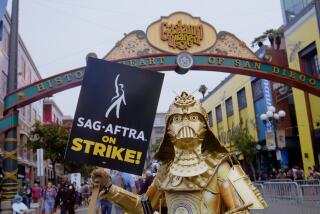Mood Somber at Securities Industry Gathering
- Share via
BOCA RATON, Fla. — Wall Street’s real power brokers all stayed home. Attendance was down 14%. And opening the brokerage industry’s 16th annual convention was a film clip of Ann Miller tap dancing her way through the hit song from the vintage movie “Easter Parade,” “Shakin’ Your Blues Away.”
Black Monday has even taken its toll on the securities industry’s yearly four-day boondoggle in this Florida resort town.
For each of the past 15 years, the week after Thanksgiving has been a time for the nation’s most profitable industry to celebrate its success. Armed with spouses and tennis rackets, the brokers have trekked year after year to the sprawling Boca Raton Hotel & Club, where everything from the hotel’s stucco exterior to the Rolls-Royce for hire is in one of Wall Street’s favorite shades, rosy pink.
This year, little else here was rosy.
“Measured” was how American Stock Exchange Chairman Arthur Levitt characterized the mood. “Somber,” said Securities Industry Assn. Chairman John W. Bachmann.
“This is perhaps the most dangerous time that we have ever faced in our business,” observed Robert Goodman, a senior vice president with the investment firm of J & W Seligman & Co.
“The mood is very somber,” added Bachmann, who also is managing principal of the investment firm Edward D. Jones & Co in St. Louis. “You can’t go through the kind of drops in the bond market and stock market we have this year and be too cheerful.”
The mix is different this year too. One chief executive of a major firm, E. F. Hutton’s Robert P. Rittereiser, had signed up to attend but instead spent the week in New York selling his company to Shearson Lehman Bros.
“The quality (of attendees) is much lower this year than it has ever been,” said Merrill Lynch spokesman William Clark. “None of our top people are here. Some of them planned to come but the (market) volume is just too great; it’s keeping everybody too busy.”
Clark and SIA officials said cost-cutting drives by the nation’s investment firms in the aftermath of the Oct. 19 stock market crash also took their toll on the convention’s attendance, which fell to 878 this year from 1,020 last year.
But there was no shortage of high-level regulators at the convention. And their message, too, was anything but rosy.
Securities & Exchange Commission Chairman David S. Ruder, noting that the crash exposed a serious inadequacy of capital among the stock exchange specialist firms, urged the industry to make emergency capital available to its own during turbulent times or face a disaster far worse than the 508-point plunge that the Dow Jones industrial average suffered on Oct. 19.
“I am concerned that we might be vulnerable to a dramatic market problem,” Ruder told the convention.
As worrisome as the capital shortage, he said, is the industry’s tarnished image.
“We have heard from large numbers of investors who complained that during the market break they could not reach their brokers to place orders, or that brokers delayed in notifying them whether their trades had been executed. The clear perception of many investors was that securities firms served their institutional customers at the expense of retail investors,” Ruder said.
The SEC chairman said the commission has received twice the usual number of complaints ever since the crash and warned that “if public confidence is to be bolstered, retail customers need to be reassured that their brokers are faithfully representing their interests.”
Rep. Edward J. Markey (D-Mass.) also admonished the industry--for its bad attitude. Noting that he detects disdain on Wall Street for him and others in Washington who are investigating the market crash, Markey said: “Something has gone wrong, and if collectively we can’t say the words ‘I made a mistake,’ then we’re only setting the stage for worse problems ahead.”
Similarly, E. Gerald Corrigan, president of the Federal Reserve Bank of New York, preached restraint and discipline. Otherwise, he warned, “you will end up with regressive legislation.”
But in the wake of Oct. 19, not everyone connected to the securities industry still views re-regulation with alarm.
“I never thought I would say this,” said a high-level stock exchange official. “But I am eagerly awaiting more regulation.”
More to Read
Inside the business of entertainment
The Wide Shot brings you news, analysis and insights on everything from streaming wars to production — and what it all means for the future.
You may occasionally receive promotional content from the Los Angeles Times.










